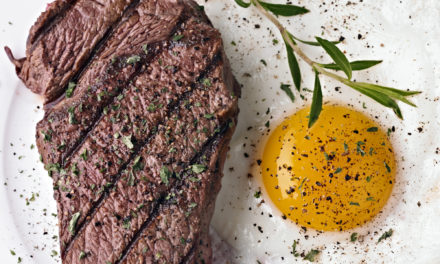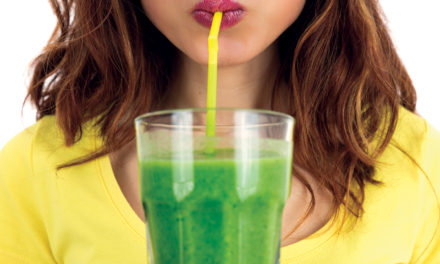With the right food choices, you can increase focus, reduce anxiety, and feel happier.
When you’ve had one of those days—or weeks or months—you might try to cure your bad mood by making a beeline for your favorite comfort foods. And while plowing through a plate of nachos or pint of Ben & Jerry’s may give you an immediate boost, research shows processed, low-on-nutrients foods like these can actually make you feel worse overall, raising your blood sugar only to have it crash minutes later—which in turn will make you feel even worse (not to mention bloated, and feeling bad about your self-control), plus hungry for more junk food.
Chances are you’ve heard the saying “You are what you eat”—and that bad-mood, junk-food binge I just described is a prime example of it. Most of us have likely experienced, in one way or another, the different ways food can make us feel. I know I’ve felt energized after downing a protein-packed kale smoothie for breakfast—and totally sluggish after eating a carbohydrate-heavy lunch. Recently, I was talking to a woman at the gym who told me she felt like a “rock star” during our workout because she had spent 3 weeks making healthy food choices. When you fuel your body with the right foods and nutrients, your body rewards you. On the flip side, eating a diet full of processed foods can cause a series of cascading effects that can torpedo your mood, make you more susceptible to anxiety and depression, and even intensify PMS (as if it wasn’t bad enough).
We often don’t stop to think about how the foods we eat could be contributing to our mood from the inside out. Yet research shows that certain foods can help keep brain chemicals and hormones balanced, which directly impacts how we feel. Here’s the deal: When you digest food, it goes to the brain in your gut—a.k.a., your microbiome, which is like a little factory of good and bad bugs that acts as a control center for our immune system, hormones, and more.
“Our gut health is not only directly linked to our physical health, but also to our mental well-being,” says Melissa Mishler, a certified health coach and licensed pharmacist in Bucks County. “Foods that disrupt the balance of bacteria in the microbiome can lead to a decrease in serotonin production, a hormone that helps us feel good,” she says. “Foods that promote a balance of bugs keep our brain chemicals and hormones balanced, producing hormones that can make us more joyful.”
In a nutshell: Dopamine, serotonin, and endorphins are all mood-altering hormones produced by the brain and the gut as a chemical reaction to food. Dopamine and serotonin are responsible for feelings of joy; endorphins are released to create feelings of euphoria. (Read: When you’ve got plenty of these hormones pumping through your veins, you feel much better.) Eating a meal full of processed and artificial ingredients will decrease the amount of these hormones in your system—ultimately making you feel down.
Now, is one moment-of-weakness or fast-food drive-through meal going to wreak havoc on your mood? Probably not. Yet over time, a diet rich in these kinds of junky, processed foods and low on fresh fruits, veggies, and clean proteins will deteriorate your mental and physical well-being, says Mishler. The good news? Adding a variety of healthy foods from all of the food groups to your diet will lead to improved mental focus and reduced brain fog—and they work fast. Not only that, but certain mood-boosting foods can even help stop a bad mood in its tracks, reduce anxiety and depression, and eliminate the kind of crankiness, moodiness, and emotional rollercoasters so many of us deal with during PMS.
“Consistently eating these feel-good foods is going to give you the best results,” says Mishler. “But that doesn’t mean you have to totally overhaul your diet. Simply making small changes can go a long way toward supporting your hormone health, and in turn your mood.”
Foods that promote a balance of bugs keep our brain chemicals and hormones balanced, producing hormones that can make us more joyful.
Happy and You Know It
Ready to feel happier and healthier no matter what kind of day (or week or month or year) you’re having? Add one or more of these mood-boosting foods to your go-to meals and snacks to help you feel better and improve your state of mind:
Salmon
This heart-healthy fish is high in omega-3 fatty acids, which have been shown to improve sleep (a surefire way to feel happier!) and reduce the frequency of mood swings.
Oranges and berries
These brightly colored fruits are high in immune-boosting vitamin C, a powerful antioxidant that’s been shown to help your body fight free radicals and recover from stress—and decrease the symptoms of depression as a result.
Chicken
In addition to being a healthy source of protein (especially when you choose the free-range, organic variety), chicken also contains amino acids, which have been shown to help maintain a happy mood. Plus, chicken is a good source of vitamin B12, which the brain uses to stimulate the release of dopamine and lift your spirits.
Chocolate
Here’s some good news for chocolate lovers: High-quality dark chocolate (that means it’s made with at least 70 percent cacao or more) contains high levels of magnesium, which can keep your dopamine levels elevated. Chocolate also contains phytonutrients that cause the body to release endorphins.
Shrimp
Talk about a powerhouse in a small package: Shrimp provides protein, vitamin B12, omega-3 fatty acids, B3, and magnesium—all nutrients, vitamins, and minerals that have been shown to reduce stress and release feel-good hormones.
Almonds
Often touted for their heart-health benefits, these nuts also contain many mood-boosting nutrients, including magnesium, vitamin B2, and vitamin E.
Asparagus
The Chinese government actually approved asparagus extract as a natural, functional food ingredient because of its anti-anxiety properties. The vegetable is loaded with folic acid—and low levels of folic acid have been linked to anxiety.
Turmeric Root
Curcumin, which can be found in turmeric root, can help balance serotonin and dopamine, which helps to even out your mood. Just be sure to eat it with a healthy fat (such as coconut oil) and black pepper, which make the curcumin more absorbable by your body.
Beets
These root veggies can alleviate symptoms of PMS thanks to high levels of vitamin B1 (also called thiamine), which is responsible for fighting mood swings.
Cruciferous veggies
All of the vegetables you probably hated as a kid—broccoli, cauliflower, and Brussels sprouts—are part of the crucifer family, and they are loaded in folate, which helps your body produce more serotonin and dopamine.






